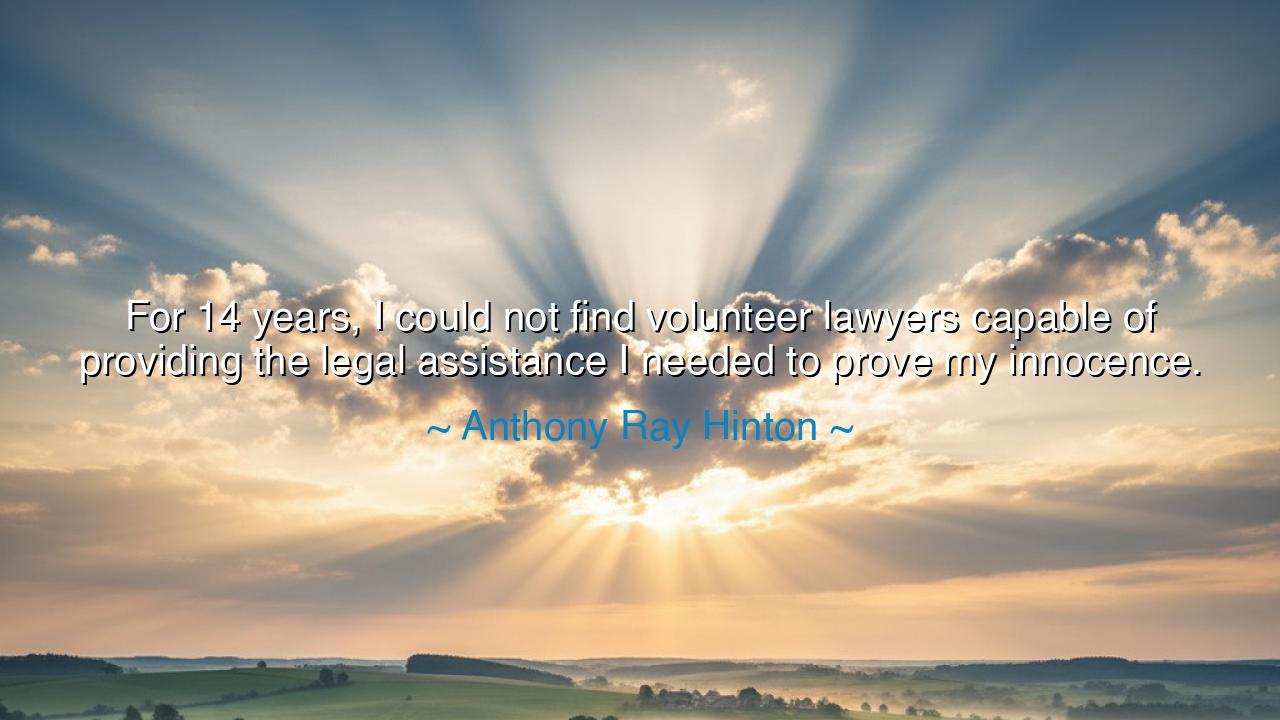
For 14 years, I could not find volunteer lawyers capable of
For 14 years, I could not find volunteer lawyers capable of providing the legal assistance I needed to prove my innocence.






When Anthony Ray Hinton said, “For 14 years, I could not find volunteer lawyers capable of providing the legal assistance I needed to prove my innocence,” he was not merely recounting his suffering — he was revealing the silent tragedy of a justice system that had lost its mercy. His words carry the weight of both despair and revelation, for they speak not only of his own pain, but of the countless voiceless souls crushed beneath the machinery of law without compassion. In his voice, we hear the cry of the imprisoned innocent, the man chained not by guilt, but by neglect — a man left to wait in darkness for the world to remember his humanity. It is a cry as old as time: that justice delayed is justice denied, and that the measure of a society is not how it treats the powerful, but how it hears the powerless.
In the style of the ancients, one might say that Hinton’s story is the modern echo of Job’s lament — a righteous man tested by an unjust world, his soul refined by the fire of patience and faith. Fourteen years he waited, not for forgiveness, but for truth to find its voice. He had been wrongfully convicted of murder in the state of Alabama, condemned to death, and left to rot in a cell barely larger than a tomb. He did not ask for mercy, only for fairness; not for sympathy, but for someone to see what was right before their eyes. Yet the world, deafened by indifference and fear, turned away. His statement exposes a wound in the heart of civilization: that justice, when starved of equality, becomes cruelty disguised as order.
The origin of this quote lies in the years Anthony Ray Hinton spent on death row — thirty long years in total, fourteen of which he sought but could not find the legal aid he needed to prove his innocence. His case eventually drew the attention of the Equal Justice Initiative, led by Bryan Stevenson, whose courage and compassion finally brought Hinton’s case back before the courts. When the truth was finally heard, all evidence against him crumbled. The same system that had condemned him could no longer deny that it had erred. In 2015, after three decades of wrongful imprisonment, Hinton walked free — a man who had suffered at the hands of injustice in the name of law. His quote, therefore, is not only a memory but a monument: a reminder that the scales of justice tilt only when men of conscience lift them.
History is full of such shadows — of men imprisoned by error, pride, and indifference. The ancients, too, knew this suffering. Recall Socrates, condemned by the city he loved, forced to drink the hemlock though his only crime was truth-telling. Or Galileo, confined for daring to see beyond the blindness of his age. Yet unlike the philosophers of old, Hinton’s prison was not of ideas, but of iron and isolation. His torment was not at the hands of kings, but of a system that had forgotten its purpose. The law that should have been his protector became his executioner, and those sworn to defend him could not — or would not — come to his aid. His story stands as a warning to all generations: that when justice becomes a privilege of the rich, and defense a luxury of the few, the law itself becomes lawless.
Yet from his suffering rises something greater — the strength of forgiveness and moral endurance. Hinton emerged from three decades of captivity not with hatred, but with grace. He said, “I cannot hate, because my soul was not built for hate.” This is the voice of the sage, the man who has seen the abyss and yet refused to become its reflection. His forgiveness shames the indifferent more than anger ever could. Like the stoics of old — Epictetus, who preached wisdom from bondage — Hinton found freedom not in the courts, but in the spirit. His endurance is a mirror for all who suffer unjustly: though the body may be caged, the human spirit, when rooted in truth, cannot be conquered.
From this quote and the life behind it, a profound lesson emerges: that justice must never be left to institutions alone, but must be the shared duty of every soul that claims to be human. Laws are hollow without the conscience of those who enforce them, and innocence means nothing if society refuses to defend it. Let no man say, “It is not my concern,” for the suffering of one innocent is the silent undoing of all. We must therefore become guardians of justice in both small and great matters — to speak when others are silent, to see when others turn away, and to act when others delay. For in every age, evil triumphs not through cruelty alone, but through indifference.
So let Hinton’s words be carved into the memory of our time: “For 14 years, I could not find volunteer lawyers capable of providing the legal assistance I needed to prove my innocence.” Let this not be the story of another generation. The lesson is clear — compassion must be joined with courage, and law must be bound to love. For the true measure of justice is not in the punishment of the guilty, but in the defense of the innocent. And when humanity learns to hear the cries of those silenced by injustice, then — and only then — will the law fulfill its sacred purpose: to protect not only the body of the nation, but its very soul.






AAdministratorAdministrator
Welcome, honored guests. Please leave a comment, we will respond soon